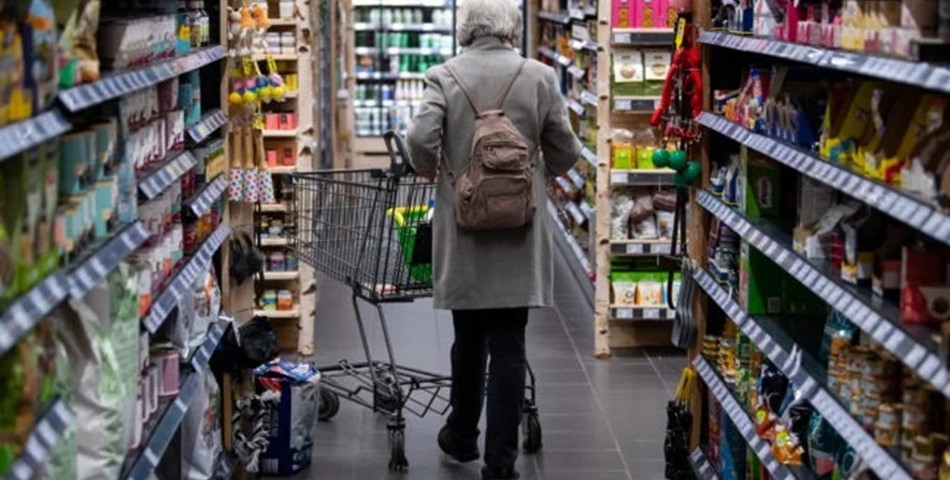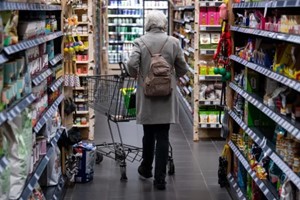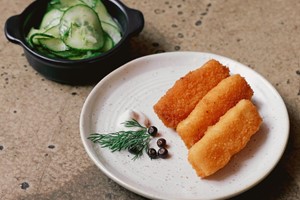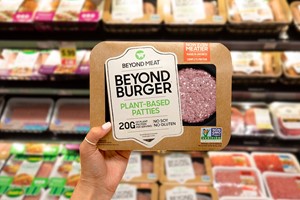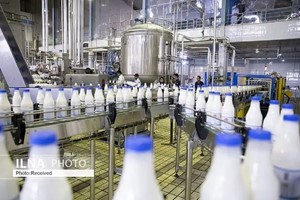Have you noticed empty shelves in your local shop? People in Germany are panic buying over worries about Russia's war in Ukraine. But supermarkets have urged customers to calm down and scale back their stockpiling.
Perhaps you’ve come across the oil aisle in a shop and found slim pickings, or worse: nothing left. Or you’ve seen a note or heard an announcement on the supermarket’s loudspeaker urging customers to only buy enough for their household.
This is because customers across Germany have been panic buying certain items over worries about food shortages during Russia’s invasion of Ukraine.
“It’s almost as bad as the first lockdown,” grocery shop owner Beate Schwarz, who’s based in Mainz-Gonseheim, told German broadcaster Tagesschau.
“I don’t understand people – they buy cooking oil and flour like crazy,” she said.
Schwarz said she has not received any cooking oil from her wholesaler this week – and that’s why she has placed a handwritten cardboard sign on the empty shelf that reads: “No, there is no more oil!”
Nuremberg supermarket telling off customers for buying oil when they don’t need it. The note says: “Are you buying oil because you need it? Or are you buying oil because everyone is doing it? If everyone buys normally, bottlenecks don’t occur. Haven’t we learned anything from the past two years??”
What’s behind the shortages?
The supply of cooking oils in supermarkets across the country is currently “lower than usual”, according to Christian Böttcher, spokesman of the Federal Association of the German Food Trade (BVLH).
The most affected product is sunflower oil – a consequence of the Russia-Ukraine war, because Ukraine is one of the world’s most important exporters of sunflower oil.
But the supply of other oils and foodstuffs, including flour and pasta, is also thinner than usual in supermarkets, said Böttcher.
“How severely individual products are affected, and whether there are regional differences, depends on the supply chain situation, and on the individual business relationships between producers, processors and traders,” he added.
However, the association says that supply issues for “basic foodstuffs or goods for daily needs” is not expected in Germany.Rather, the partial shortage has one main cause: “The lower availability of some basic foodstuffs is driven by excessive stockpiling behaviour on the part of some customers,” Böttcher said.
The association has therefore appealed to customers to buy things like flour, oil, toilet paper and pasta only in household quantities.
Experts say that production and delivery logistics of the food chain are geared towards this.
‘Far from a real emergency’
So what’s behind the phenomenon of hoarding food, which is known as Hamsterkäufe in German because it depicts hamsters filling their cheeks with their food?
Armin Nassehi, professor of sociology at Ludwig-Maximilians-Universität in Munich, told Tagesschau why people react to crises by panic buying.
“Exceptional situations overwhelm us, make us afraid,” he said. “We try to control the situation. And with the ‘hoarding purchases’ we simulate the ability to act.
“Moreover, humans tend to imitate. And if everyone suddenly buys cooking oil, then I think: ‘I have to do the same'”.
Experts say that this collective behaviour can lead to an artificial shortage of certain goods.
“What toilet paper was at the beginning of the corona pandemic is cooking oil or flour in the current crisis,” said Nassehi.
This kind of behavior is not rational. “After all, we are far from being in a real emergency situation,” he said. “And if it came to that, it would certainly make more sense to stock other things than just cooking oil.”
So, what should we have extra supplies of?
A guide from Germany’s Federal Office of Civil Protection and Disaster Assistance describes what a sensible emergency supply looks like. It says: “A person can possibly go three weeks without food, but only four days without liquid.”
Therefore, experts advise that people have 14 liters of liquid for each person in the household, as well as enough food for 10 days – and food that can be kept without refrigeration.
Every storage cupboard should also have enough candles, torches, and batteries in case the power supply fails, as well as any medicines needed.
Back in her small grocery shop in Mainz-Gonsenheim, owner Schwarz wants to continue to supply her regular customers with everything they need.
That’s why she always puts aside small quantities of flour or pasta – to make sure the elderly lady who shops with her every day has enough supplies.
“I’m just annoyed about people who now come from the discounter (supermarket) around the corner because they’re out of oil and then take the last bottles of sunflower oil here,” she said.




